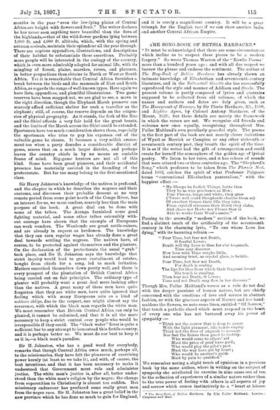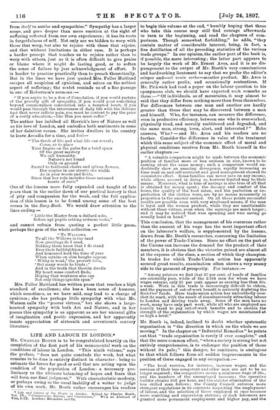ilHE SONG-BOOK OF BETHIA. HARDACRE.* " IT must be acknowledged
that there are some circumstances which incline us to suspect these pieces to be a modern
forgery." So wrote Thomas Warton of the " Rowlie Poems' more than a hundred years ago ; and with all due respect we borrow the phrase and endorse the sentiment. The author of The Day-Book of Bethia Hardacre has already shown an intimate knowledge of Elizabethan and seventeenth-century literature, and in the Saltonstall Gazette she has successfully reproduced the style and manner of Addison and Steele. The present volume is partly composed of lyrics and quatrains supposed to be collected from old volumes, of which the names and authors and dates are duly given, such as The Honeycomb of Homage, by Sir Florio Hardacre, Kt., 1598, and Lighter Ayres, by Colonel Antony Hardacre, of the Mount, 1628; but these details are merely the framework
in which the verses are set. We recognise old friends and welcome new ones equally, recognising throughout Mrs. Fuller Maitland's own peculiarly graceful style. The poems in the first part of the book are not merely clever imitations of Wyatt or Herrick or Campion or any other sixteenth or seventeenth century poet, they breath the spirit of the time. It is as if the writer had the gift of retrospection and could
create for herself the atmosphere of the golden age of lyrical poetry. We listen to her voice, and it has echoes of sounds that were uttered two or three centuries ago. The "Shepherd's Song," which professes to be taken from The Phcenix Nest,
dated 1603, catches the spirit of what Professor Palgrave terms "conventional Elizabethan pastoralism," with the happiest effect :—
"My Sheepe be foolish Things, butte then They be as wise perchance as Men ; Fine Fleeces, longe and white, they grow ('Twere well could Sheepherds cloathe them so) Of sweetest Grasse their flue they take, From crystall streames their thirst they slake, And chuse nor Herbe nor Flouer that is Able to worke their Weal's amiss."
Passing to till avowedly " modern " section of the book, we find a distinct touch of the artificiality of the seventeenth century in the charming lyric, "To one whose Love lies dying," with its haunting refrain :—
"Fear Time, but fear not Death,
0 fearful Lover ; Death will thy Love to thee for e'er bequeath.
Time may discover How love with Time weighs little, And seeming trust, as crystal glass, is brittle.
Fear Time, but fear not Death, For death is sealing The lips for thee from which their fragrant breatl His touch is stealing.
Then fear net Death, 0 Lover; Time and not Death may flaw in her discover."
Though Mrs. Faller Maitland's verses as a rule do not deal with the deeper passions of human nature, but are chiefly concerned with the emotions of love and sorrow in abstract fashion, or with the gracious aspects of Nature and her hand- maidens the flowers, we note some lines, entitled "Of Sorrow," that touch a pathetic chord which must respond in the heart
of every one who has not bartered away his power of sympathy :—
"Think not the sorrow that is deep to gauge
With the light plummet, idle hands employ Think not the fires of anguish to assuage Nor feel the flames thou goest to destroy. Who would come to others' aid Must the price of grief have paid; Who would play the pilot's part Must the way have got by heart ; Who would be another's guide Must by pain be qualified."
We remember noting a slight touch of cynicism in a previous book by the same author, where in writing on the subject of sympathy she attributed its exercise in nine cases out of ten to the reflection of experiences of a similar nature rather than to the true power of feeling with others in all aspects of joy and sorrow which comes instinctively to a "heart at leisure
• The Song-Book of Bet ha Hardacre. By Ella Fuller Maitland, London Chapman and Hall. from itself to soothe and sympathise." Sympathy has a larger scope, and goes deeper than mere emotion at the sight of suffering reflected from our own experiences ; it has its roots
in forgetfulness of self. Not only are we bidden to weep with those that weep, but also to rejoice with those that rejoice,
and that without limitations in either case. It is perhaps -a harder precept that teaches us to rejoice rather than to weep with others, just as it is often difficult to give praise
or blame where it might do lasting good, or to soften the sense of failure by just acknowledgment of effort. It is harder to practise practically than to preach theoretically. But in the lines we have just quoted Mrs. Fuller Maitland escapes all suspicion of cynicism, and seizes on the noblest aspect of suffering ; the sextet reminds us of a fine passage in one of Robertson's sermons :—
"If you aspire to be a Son of Consolation, if you would partake of the priestly gift of sympathy, if you would pour something beyond commonplace consolation into a tempted heart, if you would pass through the intercourse of daily life with the delicate tact that never inflicts pain, you must be content to pay the price of a costly education,—like Him you must suffer."
The author has imbibed all Herrick's love of Nature as well as his love of London, and embodies both sentiments in some of her daintiest verses. She invites dwellers in the country to leave Arcadia for a time, and feel-
" The throb of life and what life can reveal ;
Come, so to place Your fingers on the pulse for a brief space Of the great mystery We call humanity.
Nature's not found Only on ground Sacred to feathered choirs and sylvan flowers, Her sceptre in our streets she wields As in your woods and fields, Since that her rule includes these untamed hearts of ours."
One of the lessons more fully expanded and taught of late
years than in the earlier dawn of our poetical history is that of pity and compassion for the weak, and the full applica- tion of this lesson is to be found among some of the best verses in the Song-Book. We would draw attention to the lines ending — "Little the Master from a dullard asks,
Before apt pupils setting arduous tasks,"
and cannot refrain from quoting a perfect little poem, perhaps the gem of the whole collection :—
" To WILLows.
To all the Willows in the land Now greetings do I send, Bidding them know that I do stand Ever their faithful friend.
And honoured hold the time of year
When catkins on slim boughs appear.
• Withy is weak,' the proverb tells, But many woods he binds ; ' And in the truth that therein dwells My heart some comfort finds, Hoping that weakness also can Not only things ignoble span."
Mrs. Fuller Maitland has written prose that reaches a high standard of excellence; she has a keen sense of humour, which sometimes, as we have said, may lead to a charge of cynicism ; she has perhaps little sympathy with what Mr. Watson calls the "poorer virtues," but she shows a large- hearted sympathy with both Art and Nature, and in her poems this sympathy is as apparent as are her unusual gifts of imagination and poetic expression, and her apparently innate appreciation of sixteenth and seventeenth century literature.



































 Previous page
Previous page